Exploring the Relationship Between Social Media and Well-being Essay
VerifiedAdded on 2020/11/23
|8
|2129
|181
Essay
AI Summary
This essay examines the multifaceted relationship between social networking sites and individual well-being. It begins by defining social media and well-being, and then explores how the use of platforms like Facebook and Instagram can influence psychological health and social life. The essay reviews existing research, presenting both positive and negative impacts, such as increased social capital and support versus potential for stress, anxiety, and depression. The author discusses how the effects of social media on well-being depend on individual usage patterns, including communication styles and the nature of online interactions. It also considers the role of technological advancements in mitigating negative effects. The conclusion synthesizes the findings, emphasizing the interconnectedness of social media and well-being and highlighting the importance of responsible online behavior. The essay references various studies to support its claims and provides a comprehensive overview of the topic.
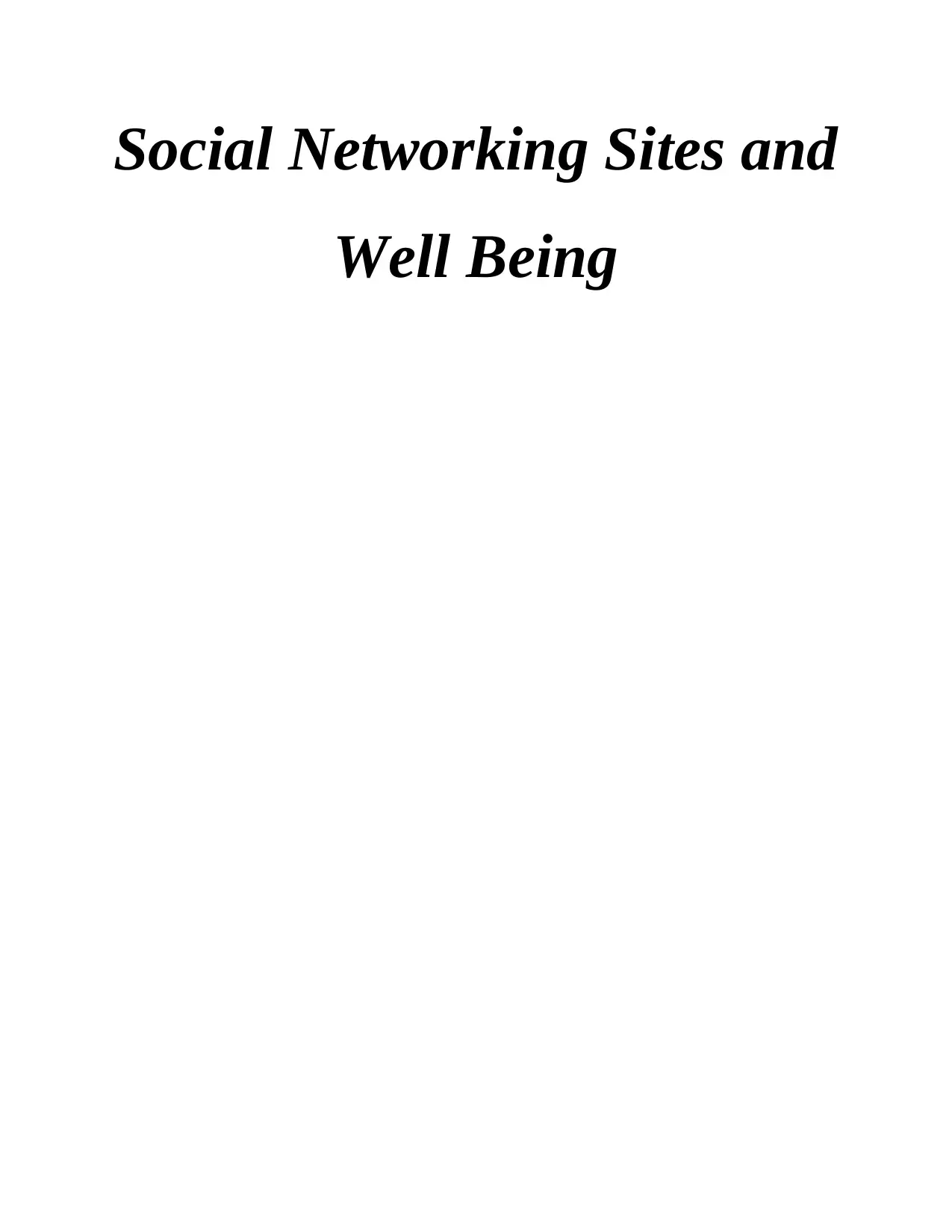
Social Networking Sites and
Well Being
Well Being
Paraphrase This Document
Need a fresh take? Get an instant paraphrase of this document with our AI Paraphraser
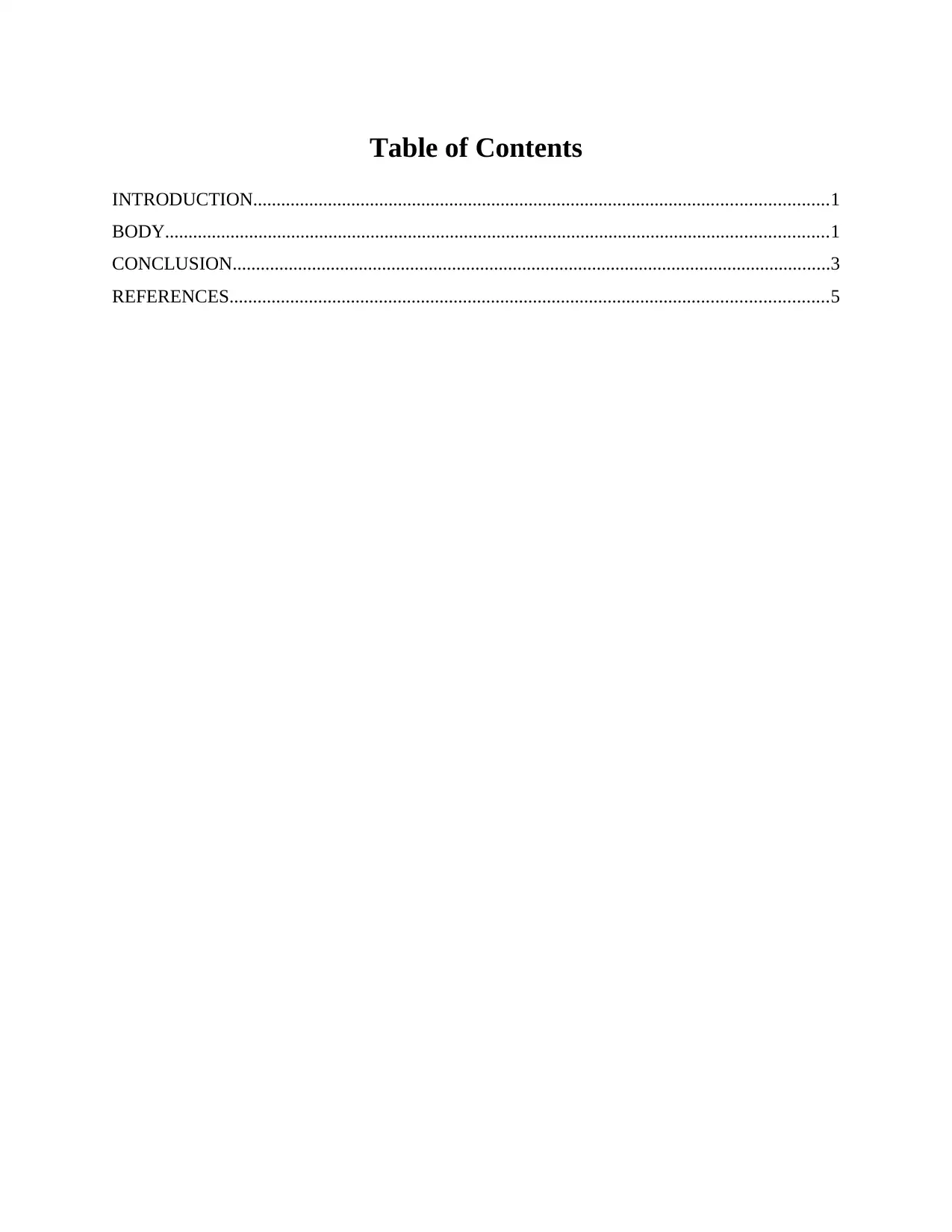
Table of Contents
INTRODUCTION...........................................................................................................................1
BODY..............................................................................................................................................1
CONCLUSION................................................................................................................................3
REFERENCES................................................................................................................................5
INTRODUCTION...........................................................................................................................1
BODY..............................................................................................................................................1
CONCLUSION................................................................................................................................3
REFERENCES................................................................................................................................5
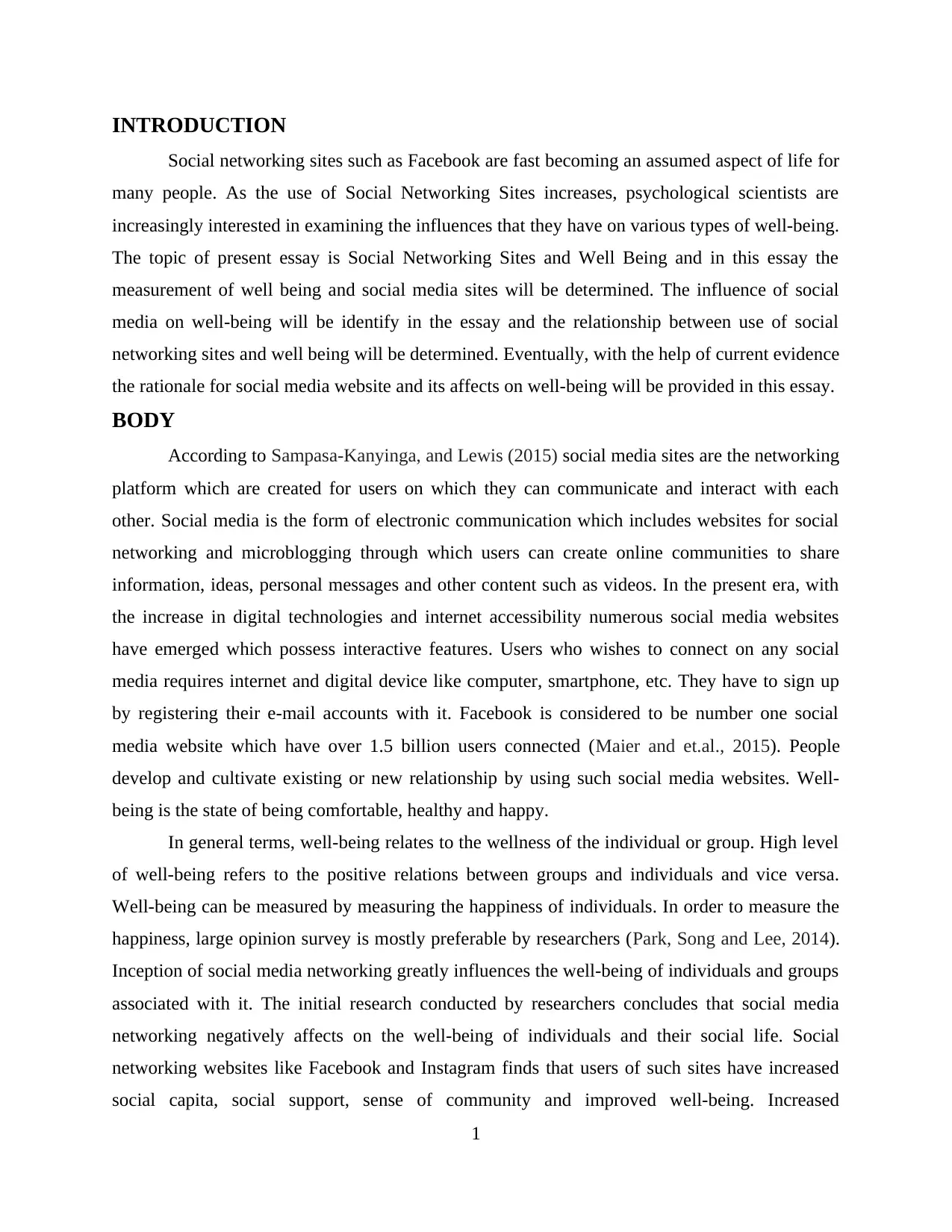
INTRODUCTION
Social networking sites such as Facebook are fast becoming an assumed aspect of life for
many people. As the use of Social Networking Sites increases, psychological scientists are
increasingly interested in examining the influences that they have on various types of well-being.
The topic of present essay is Social Networking Sites and Well Being and in this essay the
measurement of well being and social media sites will be determined. The influence of social
media on well-being will be identify in the essay and the relationship between use of social
networking sites and well being will be determined. Eventually, with the help of current evidence
the rationale for social media website and its affects on well-being will be provided in this essay.
BODY
According to Sampasa-Kanyinga, and Lewis (2015) social media sites are the networking
platform which are created for users on which they can communicate and interact with each
other. Social media is the form of electronic communication which includes websites for social
networking and microblogging through which users can create online communities to share
information, ideas, personal messages and other content such as videos. In the present era, with
the increase in digital technologies and internet accessibility numerous social media websites
have emerged which possess interactive features. Users who wishes to connect on any social
media requires internet and digital device like computer, smartphone, etc. They have to sign up
by registering their e-mail accounts with it. Facebook is considered to be number one social
media website which have over 1.5 billion users connected (Maier and et.al., 2015). People
develop and cultivate existing or new relationship by using such social media websites. Well-
being is the state of being comfortable, healthy and happy.
In general terms, well-being relates to the wellness of the individual or group. High level
of well-being refers to the positive relations between groups and individuals and vice versa.
Well-being can be measured by measuring the happiness of individuals. In order to measure the
happiness, large opinion survey is mostly preferable by researchers (Park, Song and Lee, 2014).
Inception of social media networking greatly influences the well-being of individuals and groups
associated with it. The initial research conducted by researchers concludes that social media
networking negatively affects on the well-being of individuals and their social life. Social
networking websites like Facebook and Instagram finds that users of such sites have increased
social capita, social support, sense of community and improved well-being. Increased
1
Social networking sites such as Facebook are fast becoming an assumed aspect of life for
many people. As the use of Social Networking Sites increases, psychological scientists are
increasingly interested in examining the influences that they have on various types of well-being.
The topic of present essay is Social Networking Sites and Well Being and in this essay the
measurement of well being and social media sites will be determined. The influence of social
media on well-being will be identify in the essay and the relationship between use of social
networking sites and well being will be determined. Eventually, with the help of current evidence
the rationale for social media website and its affects on well-being will be provided in this essay.
BODY
According to Sampasa-Kanyinga, and Lewis (2015) social media sites are the networking
platform which are created for users on which they can communicate and interact with each
other. Social media is the form of electronic communication which includes websites for social
networking and microblogging through which users can create online communities to share
information, ideas, personal messages and other content such as videos. In the present era, with
the increase in digital technologies and internet accessibility numerous social media websites
have emerged which possess interactive features. Users who wishes to connect on any social
media requires internet and digital device like computer, smartphone, etc. They have to sign up
by registering their e-mail accounts with it. Facebook is considered to be number one social
media website which have over 1.5 billion users connected (Maier and et.al., 2015). People
develop and cultivate existing or new relationship by using such social media websites. Well-
being is the state of being comfortable, healthy and happy.
In general terms, well-being relates to the wellness of the individual or group. High level
of well-being refers to the positive relations between groups and individuals and vice versa.
Well-being can be measured by measuring the happiness of individuals. In order to measure the
happiness, large opinion survey is mostly preferable by researchers (Park, Song and Lee, 2014).
Inception of social media networking greatly influences the well-being of individuals and groups
associated with it. The initial research conducted by researchers concludes that social media
networking negatively affects on the well-being of individuals and their social life. Social
networking websites like Facebook and Instagram finds that users of such sites have increased
social capita, social support, sense of community and improved well-being. Increased
1
⊘ This is a preview!⊘
Do you want full access?
Subscribe today to unlock all pages.

Trusted by 1+ million students worldwide
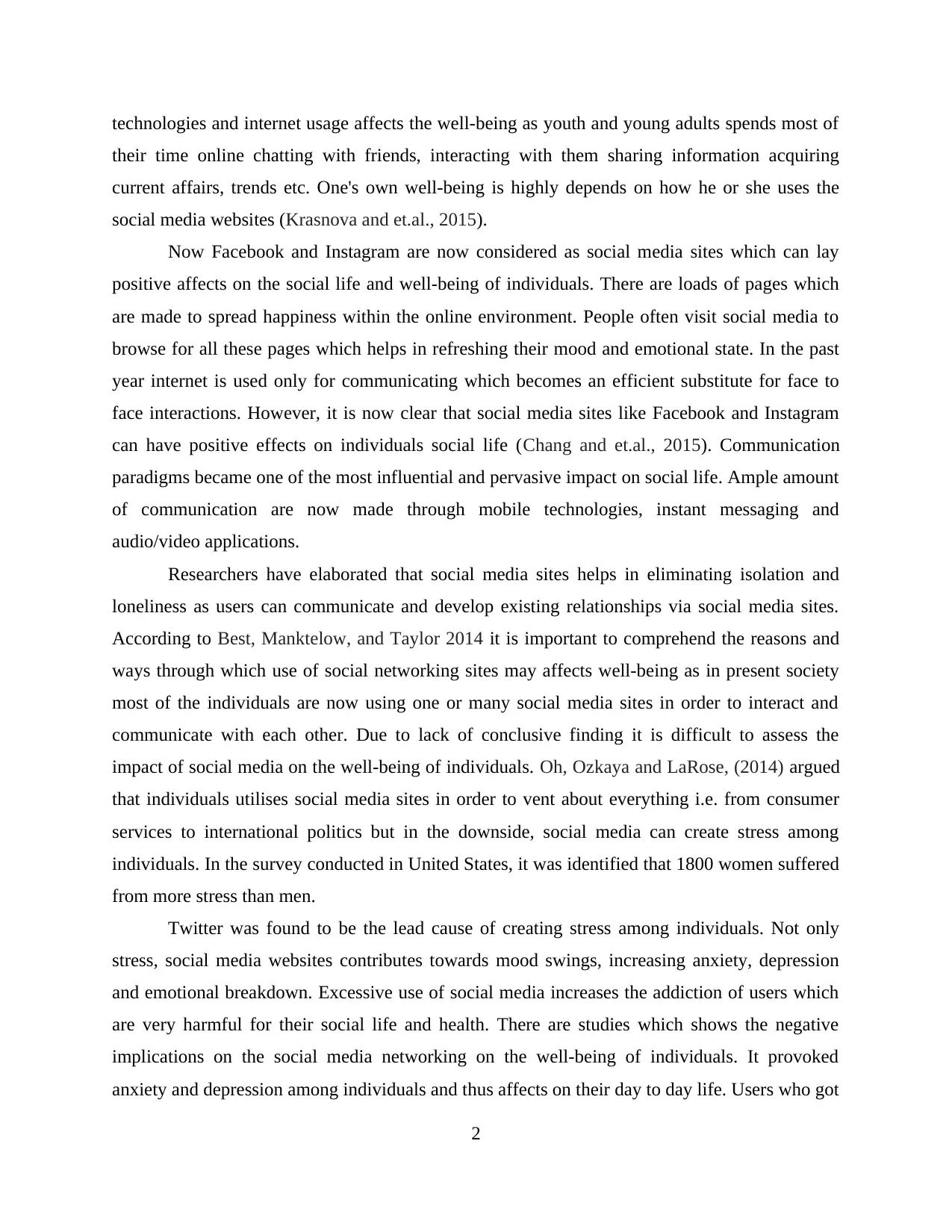
technologies and internet usage affects the well-being as youth and young adults spends most of
their time online chatting with friends, interacting with them sharing information acquiring
current affairs, trends etc. One's own well-being is highly depends on how he or she uses the
social media websites (Krasnova and et.al., 2015).
Now Facebook and Instagram are now considered as social media sites which can lay
positive affects on the social life and well-being of individuals. There are loads of pages which
are made to spread happiness within the online environment. People often visit social media to
browse for all these pages which helps in refreshing their mood and emotional state. In the past
year internet is used only for communicating which becomes an efficient substitute for face to
face interactions. However, it is now clear that social media sites like Facebook and Instagram
can have positive effects on individuals social life (Chang and et.al., 2015). Communication
paradigms became one of the most influential and pervasive impact on social life. Ample amount
of communication are now made through mobile technologies, instant messaging and
audio/video applications.
Researchers have elaborated that social media sites helps in eliminating isolation and
loneliness as users can communicate and develop existing relationships via social media sites.
According to Best, Manktelow, and Taylor 2014 it is important to comprehend the reasons and
ways through which use of social networking sites may affects well-being as in present society
most of the individuals are now using one or many social media sites in order to interact and
communicate with each other. Due to lack of conclusive finding it is difficult to assess the
impact of social media on the well-being of individuals. Oh, Ozkaya and LaRose, (2014) argued
that individuals utilises social media sites in order to vent about everything i.e. from consumer
services to international politics but in the downside, social media can create stress among
individuals. In the survey conducted in United States, it was identified that 1800 women suffered
from more stress than men.
Twitter was found to be the lead cause of creating stress among individuals. Not only
stress, social media websites contributes towards mood swings, increasing anxiety, depression
and emotional breakdown. Excessive use of social media increases the addiction of users which
are very harmful for their social life and health. There are studies which shows the negative
implications on the social media networking on the well-being of individuals. It provoked
anxiety and depression among individuals and thus affects on their day to day life. Users who got
2
their time online chatting with friends, interacting with them sharing information acquiring
current affairs, trends etc. One's own well-being is highly depends on how he or she uses the
social media websites (Krasnova and et.al., 2015).
Now Facebook and Instagram are now considered as social media sites which can lay
positive affects on the social life and well-being of individuals. There are loads of pages which
are made to spread happiness within the online environment. People often visit social media to
browse for all these pages which helps in refreshing their mood and emotional state. In the past
year internet is used only for communicating which becomes an efficient substitute for face to
face interactions. However, it is now clear that social media sites like Facebook and Instagram
can have positive effects on individuals social life (Chang and et.al., 2015). Communication
paradigms became one of the most influential and pervasive impact on social life. Ample amount
of communication are now made through mobile technologies, instant messaging and
audio/video applications.
Researchers have elaborated that social media sites helps in eliminating isolation and
loneliness as users can communicate and develop existing relationships via social media sites.
According to Best, Manktelow, and Taylor 2014 it is important to comprehend the reasons and
ways through which use of social networking sites may affects well-being as in present society
most of the individuals are now using one or many social media sites in order to interact and
communicate with each other. Due to lack of conclusive finding it is difficult to assess the
impact of social media on the well-being of individuals. Oh, Ozkaya and LaRose, (2014) argued
that individuals utilises social media sites in order to vent about everything i.e. from consumer
services to international politics but in the downside, social media can create stress among
individuals. In the survey conducted in United States, it was identified that 1800 women suffered
from more stress than men.
Twitter was found to be the lead cause of creating stress among individuals. Not only
stress, social media websites contributes towards mood swings, increasing anxiety, depression
and emotional breakdown. Excessive use of social media increases the addiction of users which
are very harmful for their social life and health. There are studies which shows the negative
implications on the social media networking on the well-being of individuals. It provoked
anxiety and depression among individuals and thus affects on their day to day life. Users who got
2
Paraphrase This Document
Need a fresh take? Get an instant paraphrase of this document with our AI Paraphraser
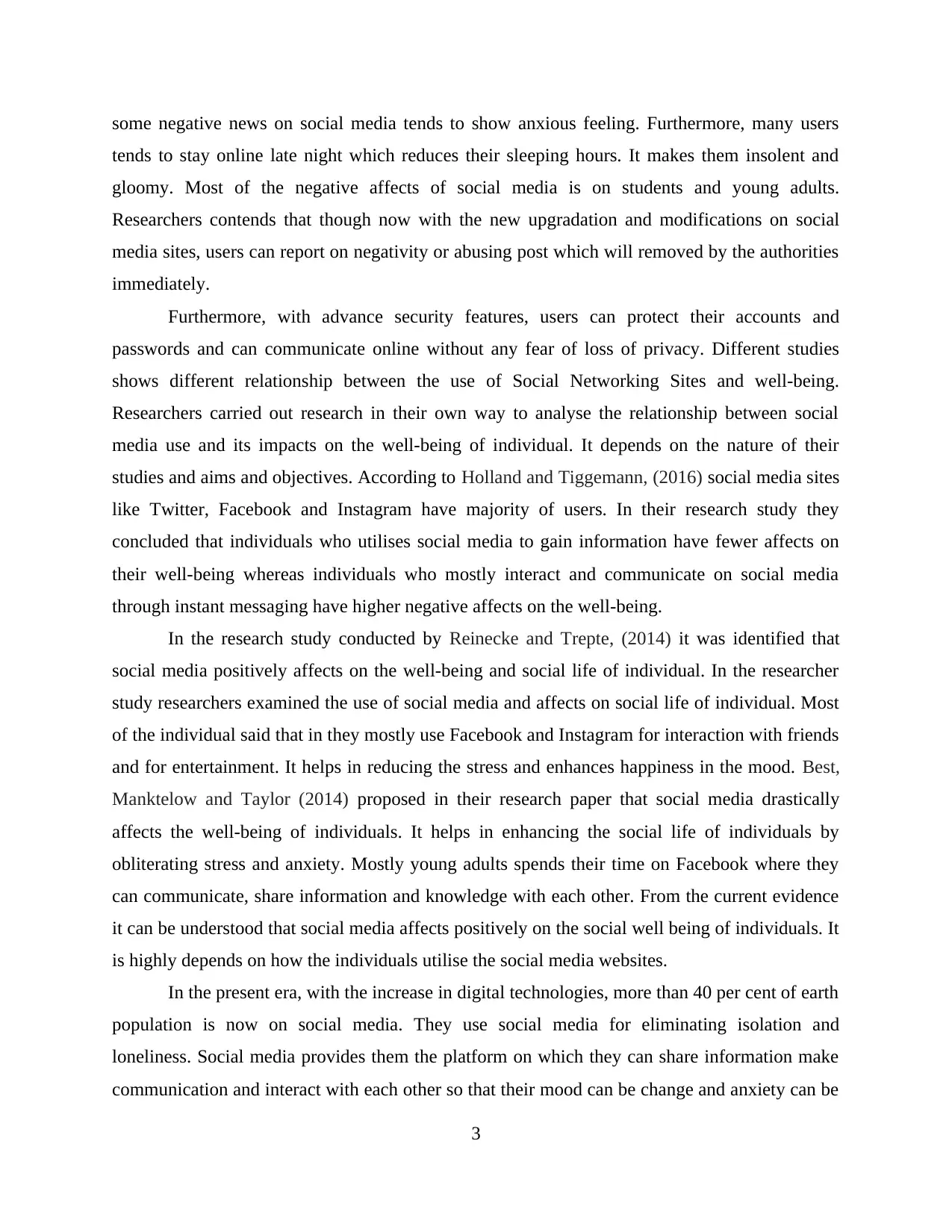
some negative news on social media tends to show anxious feeling. Furthermore, many users
tends to stay online late night which reduces their sleeping hours. It makes them insolent and
gloomy. Most of the negative affects of social media is on students and young adults.
Researchers contends that though now with the new upgradation and modifications on social
media sites, users can report on negativity or abusing post which will removed by the authorities
immediately.
Furthermore, with advance security features, users can protect their accounts and
passwords and can communicate online without any fear of loss of privacy. Different studies
shows different relationship between the use of Social Networking Sites and well-being.
Researchers carried out research in their own way to analyse the relationship between social
media use and its impacts on the well-being of individual. It depends on the nature of their
studies and aims and objectives. According to Holland and Tiggemann, (2016) social media sites
like Twitter, Facebook and Instagram have majority of users. In their research study they
concluded that individuals who utilises social media to gain information have fewer affects on
their well-being whereas individuals who mostly interact and communicate on social media
through instant messaging have higher negative affects on the well-being.
In the research study conducted by Reinecke and Trepte, (2014) it was identified that
social media positively affects on the well-being and social life of individual. In the researcher
study researchers examined the use of social media and affects on social life of individual. Most
of the individual said that in they mostly use Facebook and Instagram for interaction with friends
and for entertainment. It helps in reducing the stress and enhances happiness in the mood. Best,
Manktelow and Taylor (2014) proposed in their research paper that social media drastically
affects the well-being of individuals. It helps in enhancing the social life of individuals by
obliterating stress and anxiety. Mostly young adults spends their time on Facebook where they
can communicate, share information and knowledge with each other. From the current evidence
it can be understood that social media affects positively on the social well being of individuals. It
is highly depends on how the individuals utilise the social media websites.
In the present era, with the increase in digital technologies, more than 40 per cent of earth
population is now on social media. They use social media for eliminating isolation and
loneliness. Social media provides them the platform on which they can share information make
communication and interact with each other so that their mood can be change and anxiety can be
3
tends to stay online late night which reduces their sleeping hours. It makes them insolent and
gloomy. Most of the negative affects of social media is on students and young adults.
Researchers contends that though now with the new upgradation and modifications on social
media sites, users can report on negativity or abusing post which will removed by the authorities
immediately.
Furthermore, with advance security features, users can protect their accounts and
passwords and can communicate online without any fear of loss of privacy. Different studies
shows different relationship between the use of Social Networking Sites and well-being.
Researchers carried out research in their own way to analyse the relationship between social
media use and its impacts on the well-being of individual. It depends on the nature of their
studies and aims and objectives. According to Holland and Tiggemann, (2016) social media sites
like Twitter, Facebook and Instagram have majority of users. In their research study they
concluded that individuals who utilises social media to gain information have fewer affects on
their well-being whereas individuals who mostly interact and communicate on social media
through instant messaging have higher negative affects on the well-being.
In the research study conducted by Reinecke and Trepte, (2014) it was identified that
social media positively affects on the well-being and social life of individual. In the researcher
study researchers examined the use of social media and affects on social life of individual. Most
of the individual said that in they mostly use Facebook and Instagram for interaction with friends
and for entertainment. It helps in reducing the stress and enhances happiness in the mood. Best,
Manktelow and Taylor (2014) proposed in their research paper that social media drastically
affects the well-being of individuals. It helps in enhancing the social life of individuals by
obliterating stress and anxiety. Mostly young adults spends their time on Facebook where they
can communicate, share information and knowledge with each other. From the current evidence
it can be understood that social media affects positively on the social well being of individuals. It
is highly depends on how the individuals utilise the social media websites.
In the present era, with the increase in digital technologies, more than 40 per cent of earth
population is now on social media. They use social media for eliminating isolation and
loneliness. Social media provides them the platform on which they can share information make
communication and interact with each other so that their mood can be change and anxiety can be
3

reduced. Social media websites influenced the well-being of users greatly especially in present
era where maximum of young generation is connected with social media websites. They spends
lots of time on social media which can affect their social life and well-being. There are numerous
studies which states that too much spending time on social media might hamper relations of
youth with his or her family, friends and societies (Park, Song and Lee, 2014). The aura of
negativity can be perceived in the youths which can affects their social life and well-being.
Social media websites and networking become a source where anyone can share, post anything
which either enhances the well-being of individuals or hampers it. Thus, it merely depends on
users how they use social media networking.
CONCLUSION
From the above essay, it can be concluded that social media and well-being of individuals
are inter-related with each other. The focus of the present essay was on analysing the impact of
social media networking on the well being of individuals. Researchers have carried out in-depth
analysis where they found that social media sites like Facebook and Instagram can positively
affects on the mood and stress of individuals. It helps in enhancing their social life and also aid
in increasing their happiness. Researchers also argued that excessive use of social media
websites affects negatively on individual social life and well being. The essay covers the every
aspects and described it in brief and succinct manner.
4
era where maximum of young generation is connected with social media websites. They spends
lots of time on social media which can affect their social life and well-being. There are numerous
studies which states that too much spending time on social media might hamper relations of
youth with his or her family, friends and societies (Park, Song and Lee, 2014). The aura of
negativity can be perceived in the youths which can affects their social life and well-being.
Social media websites and networking become a source where anyone can share, post anything
which either enhances the well-being of individuals or hampers it. Thus, it merely depends on
users how they use social media networking.
CONCLUSION
From the above essay, it can be concluded that social media and well-being of individuals
are inter-related with each other. The focus of the present essay was on analysing the impact of
social media networking on the well being of individuals. Researchers have carried out in-depth
analysis where they found that social media sites like Facebook and Instagram can positively
affects on the mood and stress of individuals. It helps in enhancing their social life and also aid
in increasing their happiness. Researchers also argued that excessive use of social media
websites affects negatively on individual social life and well being. The essay covers the every
aspects and described it in brief and succinct manner.
4
⊘ This is a preview!⊘
Do you want full access?
Subscribe today to unlock all pages.

Trusted by 1+ million students worldwide
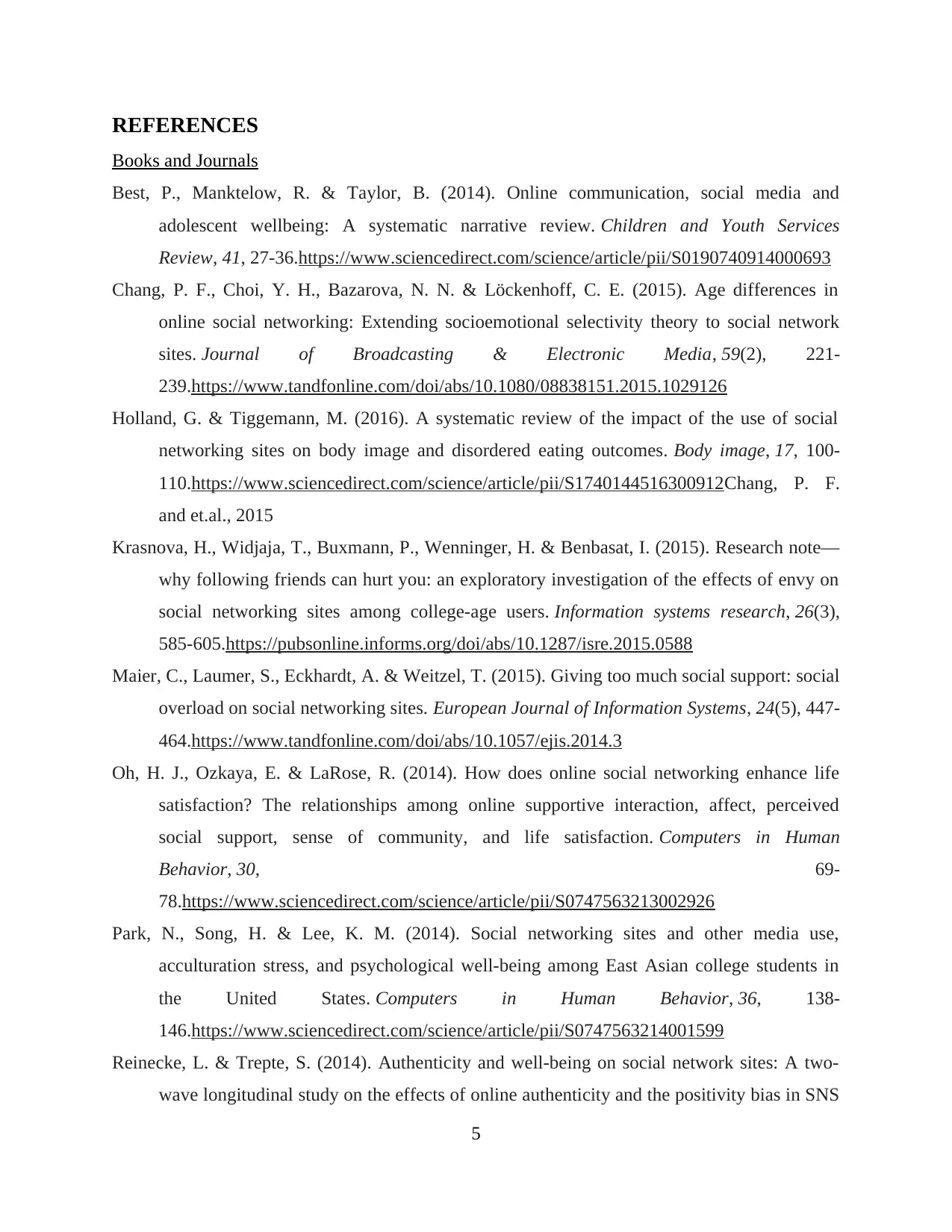
REFERENCES
Books and Journals
Best, P., Manktelow, R. & Taylor, B. (2014). Online communication, social media and
adolescent wellbeing: A systematic narrative review. Children and Youth Services
Review, 41, 27-36.https://www.sciencedirect.com/science/article/pii/S0190740914000693
Chang, P. F., Choi, Y. H., Bazarova, N. N. & Löckenhoff, C. E. (2015). Age differences in
online social networking: Extending socioemotional selectivity theory to social network
sites. Journal of Broadcasting & Electronic Media, 59(2), 221-
239.https://www.tandfonline.com/doi/abs/10.1080/08838151.2015.1029126
Holland, G. & Tiggemann, M. (2016). A systematic review of the impact of the use of social
networking sites on body image and disordered eating outcomes. Body image, 17, 100-
110.https://www.sciencedirect.com/science/article/pii/S1740144516300912Chang, P. F.
and et.al., 2015
Krasnova, H., Widjaja, T., Buxmann, P., Wenninger, H. & Benbasat, I. (2015). Research note—
why following friends can hurt you: an exploratory investigation of the effects of envy on
social networking sites among college-age users. Information systems research, 26(3),
585-605.https://pubsonline.informs.org/doi/abs/10.1287/isre.2015.0588
Maier, C., Laumer, S., Eckhardt, A. & Weitzel, T. (2015). Giving too much social support: social
overload on social networking sites. European Journal of Information Systems, 24(5), 447-
464.https://www.tandfonline.com/doi/abs/10.1057/ejis.2014.3
Oh, H. J., Ozkaya, E. & LaRose, R. (2014). How does online social networking enhance life
satisfaction? The relationships among online supportive interaction, affect, perceived
social support, sense of community, and life satisfaction. Computers in Human
Behavior, 30, 69-
78.https://www.sciencedirect.com/science/article/pii/S0747563213002926
Park, N., Song, H. & Lee, K. M. (2014). Social networking sites and other media use,
acculturation stress, and psychological well-being among East Asian college students in
the United States. Computers in Human Behavior, 36, 138-
146.https://www.sciencedirect.com/science/article/pii/S0747563214001599
Reinecke, L. & Trepte, S. (2014). Authenticity and well-being on social network sites: A two-
wave longitudinal study on the effects of online authenticity and the positivity bias in SNS
5
Books and Journals
Best, P., Manktelow, R. & Taylor, B. (2014). Online communication, social media and
adolescent wellbeing: A systematic narrative review. Children and Youth Services
Review, 41, 27-36.https://www.sciencedirect.com/science/article/pii/S0190740914000693
Chang, P. F., Choi, Y. H., Bazarova, N. N. & Löckenhoff, C. E. (2015). Age differences in
online social networking: Extending socioemotional selectivity theory to social network
sites. Journal of Broadcasting & Electronic Media, 59(2), 221-
239.https://www.tandfonline.com/doi/abs/10.1080/08838151.2015.1029126
Holland, G. & Tiggemann, M. (2016). A systematic review of the impact of the use of social
networking sites on body image and disordered eating outcomes. Body image, 17, 100-
110.https://www.sciencedirect.com/science/article/pii/S1740144516300912Chang, P. F.
and et.al., 2015
Krasnova, H., Widjaja, T., Buxmann, P., Wenninger, H. & Benbasat, I. (2015). Research note—
why following friends can hurt you: an exploratory investigation of the effects of envy on
social networking sites among college-age users. Information systems research, 26(3),
585-605.https://pubsonline.informs.org/doi/abs/10.1287/isre.2015.0588
Maier, C., Laumer, S., Eckhardt, A. & Weitzel, T. (2015). Giving too much social support: social
overload on social networking sites. European Journal of Information Systems, 24(5), 447-
464.https://www.tandfonline.com/doi/abs/10.1057/ejis.2014.3
Oh, H. J., Ozkaya, E. & LaRose, R. (2014). How does online social networking enhance life
satisfaction? The relationships among online supportive interaction, affect, perceived
social support, sense of community, and life satisfaction. Computers in Human
Behavior, 30, 69-
78.https://www.sciencedirect.com/science/article/pii/S0747563213002926
Park, N., Song, H. & Lee, K. M. (2014). Social networking sites and other media use,
acculturation stress, and psychological well-being among East Asian college students in
the United States. Computers in Human Behavior, 36, 138-
146.https://www.sciencedirect.com/science/article/pii/S0747563214001599
Reinecke, L. & Trepte, S. (2014). Authenticity and well-being on social network sites: A two-
wave longitudinal study on the effects of online authenticity and the positivity bias in SNS
5
Paraphrase This Document
Need a fresh take? Get an instant paraphrase of this document with our AI Paraphraser
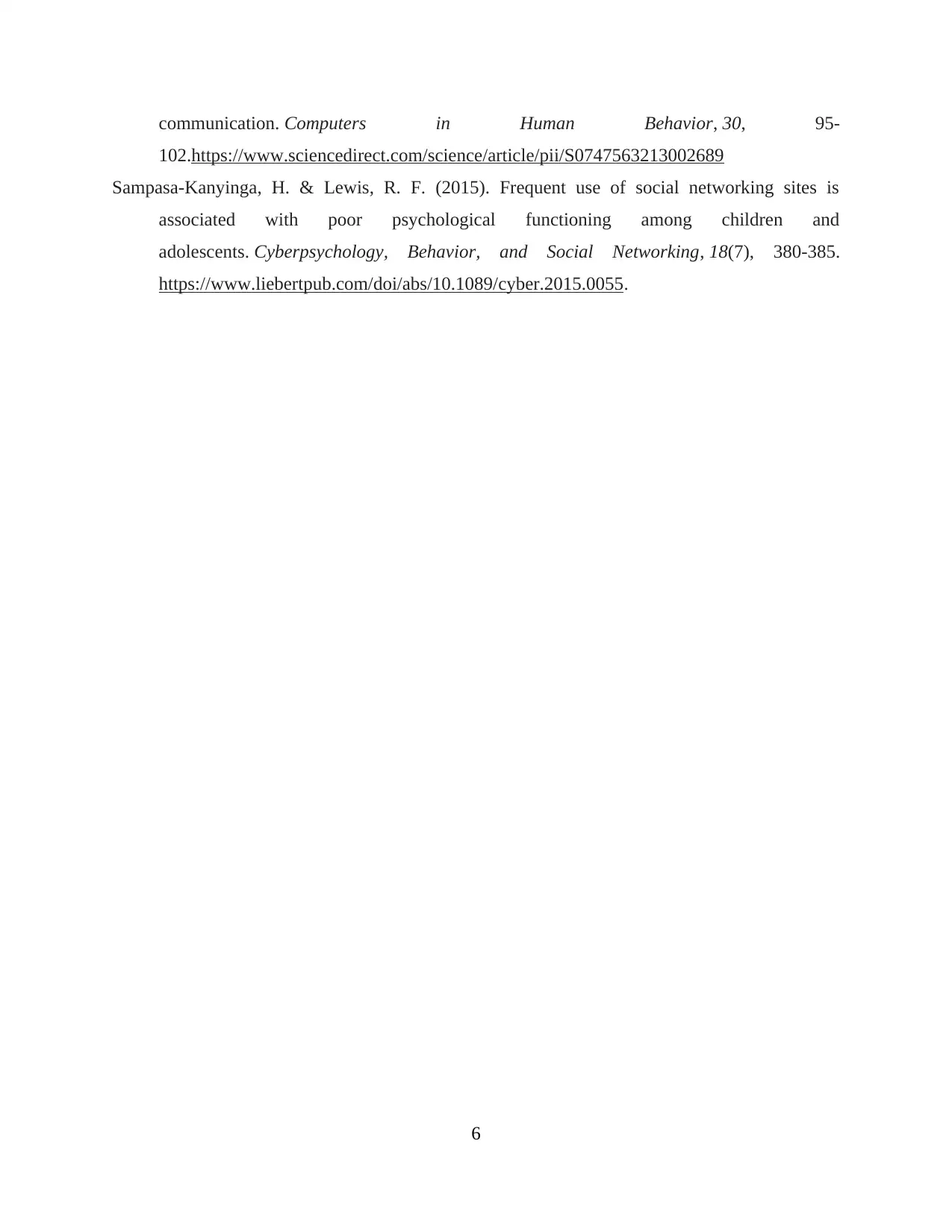
communication. Computers in Human Behavior, 30, 95-
102.https://www.sciencedirect.com/science/article/pii/S0747563213002689
Sampasa-Kanyinga, H. & Lewis, R. F. (2015). Frequent use of social networking sites is
associated with poor psychological functioning among children and
adolescents. Cyberpsychology, Behavior, and Social Networking, 18(7), 380-385.
https://www.liebertpub.com/doi/abs/10.1089/cyber.2015.0055.
6
102.https://www.sciencedirect.com/science/article/pii/S0747563213002689
Sampasa-Kanyinga, H. & Lewis, R. F. (2015). Frequent use of social networking sites is
associated with poor psychological functioning among children and
adolescents. Cyberpsychology, Behavior, and Social Networking, 18(7), 380-385.
https://www.liebertpub.com/doi/abs/10.1089/cyber.2015.0055.
6
1 out of 8
Related Documents
Your All-in-One AI-Powered Toolkit for Academic Success.
+13062052269
info@desklib.com
Available 24*7 on WhatsApp / Email
![[object Object]](/_next/static/media/star-bottom.7253800d.svg)
Unlock your academic potential
Copyright © 2020–2026 A2Z Services. All Rights Reserved. Developed and managed by ZUCOL.





